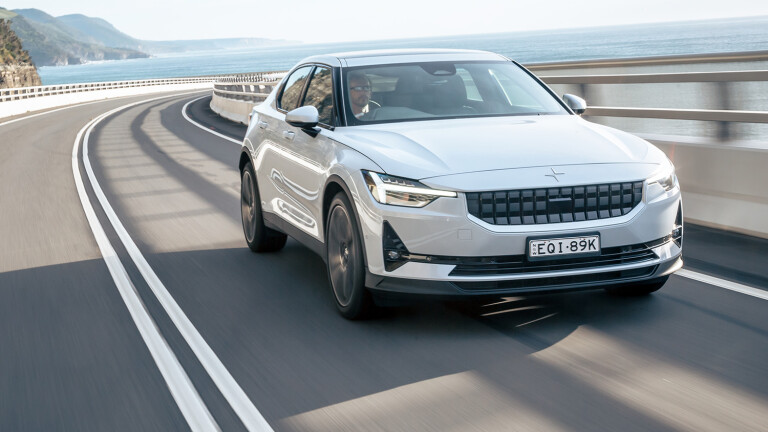
Score breakdown
Things we like
- Brilliant interior
- Fantastic ride
- Impressive chassis
Not so much
- No Apple CarPlay (yet)
- RCTA not standard
- Option package costs
- Cheap-feeling physical key
One of the most irritating phrases used in the media is a two-word headline about a product. Every new Samsung phone is an iPhone killer. Every new Tesla is a Ferrari killer. Every new EV that isn’t a Tesla is a Tesla killer. It’s lazy, it’s boring and it’s almost always never true but boy do people like to click on that nonsense.
The new Polestar 2 has, naturally, been heralded as a Tesla killer, like the Polestar 1 before it (which made no sense at all given it’s a hybrid). While it clearly isn’t, Polestar is going after the American brand with pricing, specification and – importantly – the numbers on range and performance to get somewhere close to the impressive Model 3.
A joint venture between Geely Holdings and its subsidiary Volvo Cars, Polestar is a serious EV brand intent on making serious EVs for a car market that won’t cop garbage. And as we’ll see from the specifications, separating what used to be Volvo’s performance brand from the mothership means it can get away with something the Swedish maker couldn’t.
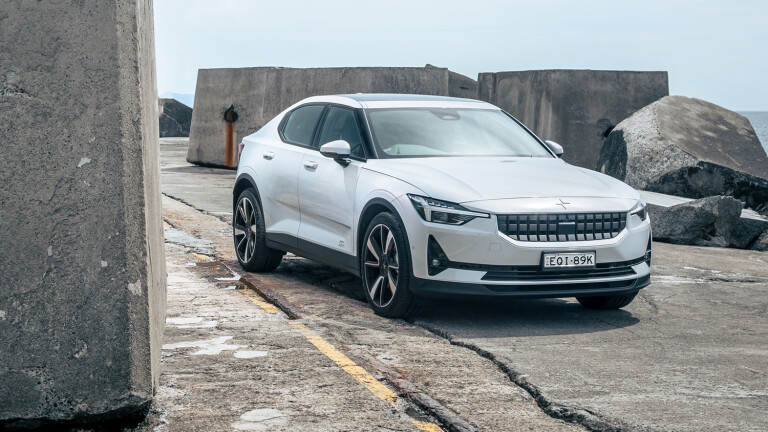
Pricing and Features
The headline price for the entry-level Polestar 2 – labouring under the less than snappy “Single Motor Standard Range” model designation – retails at $59,900 before on-road costs, baiting EV buyers who are researching a Tesla Model 3. As the name suggests, it has one motor (powering the front wheels) and the smallest battery option (69kWh for a WLTP range of 440km).
Another five grand ($64,900 + ORC) buys you the bigger 78kWh battery and a suggested 100km of extra range while a further five grand scores you 300kW, a doubling of the torque figure and 480km of range. And a disqualification from some of the EV incentives on offer in some states and territories.
My Polestar for a couple of days was this entry Long Range model, one that will surely garner a great deal of attention, particularly in NSW and Victoria where it scores a $3000 discount and stamp duty exemption, as does the standard range version. As long as you don’t option it up...
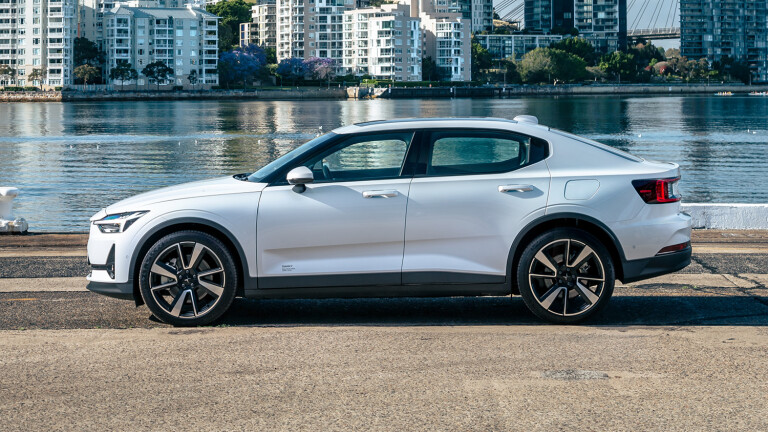
For your money you get 19-inch alloys, LED headlights, auto wipers, heated front seats, cloth trim with “3D etched” decoration, eight-speaker stereo, built-in Google media system (basically a big Android phone in the main screen), front and rear parking sensors, reversing camera, dual-zone climate control, keyless entry and start, powered tailgate with gesture control and a tyre repair kit.
If you’ve got the Polestar app on your phone, you can check the battery status, lock and unlock the doors, use the phone itself as the key and fire up the climate control, handy if you’re walking back to a hot or cold car. The phone app also sets the car up the way you left it, so if Rammstein was the last thing you were listening to, that’s what your companion will hear as you get in the car. Just a little consumer warning for you.
We weren’t able to test the app, partly because of our very brief time with the car meant setting us up with app integration would be a giant pain for everyone involved.
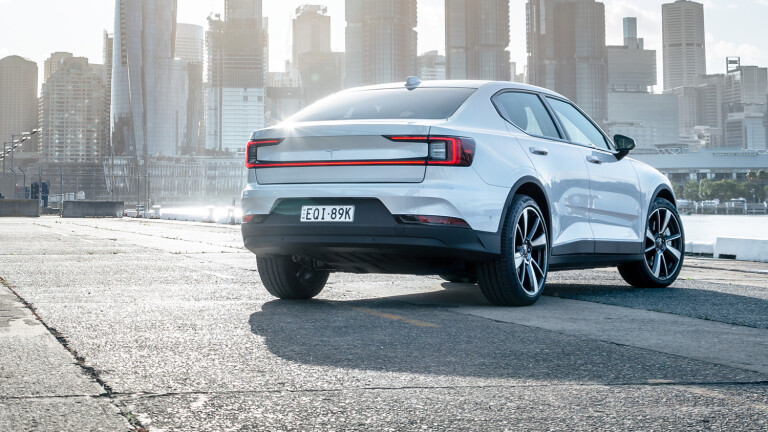
While the pricing is competitive, there is no small amount of controversy stemming from the relative lack of safety equipment compared to parent brand Volvo. Now, it’s not as though the basic car is a 1990’s Excel – it has lane-keep assist, forward AEB, lane and road departure warning, driver attention monitoring, road sign recognition and the airbag count includes centre airbags. I’m fairly certain the Polestar will sail through to five-star ANCAP glory as it did with EuroNCAP in March 2021, without the additional safety.
The Pilot Pack bolsters the standard feature list with driver assistance, active cruise control, 360-degree cameras, blind-spot monitoring, front and rear cross-traffic alert, rear collision warning and rear AEB.
You also score the fancy Pixel LED headlights and LED front fog lights. That’s a $5000 option and it was fitted to the Long Range car I had. Irritatingly, that $5000 is roughly what you would save in Victoria and NSW. When you add it to the Long Range, it busts the dutiable limit and you only save a few grand on stamp duty.
Going for the $6000 Plus Pack throws in a massive glass sunroof, Harmon Kardon 13-speaker audio, wireless phone charging, WeaveTech vegan upholstery, heated electric front seats with memory, and heating for the rear seats, steering wheel and wiper nozzles.
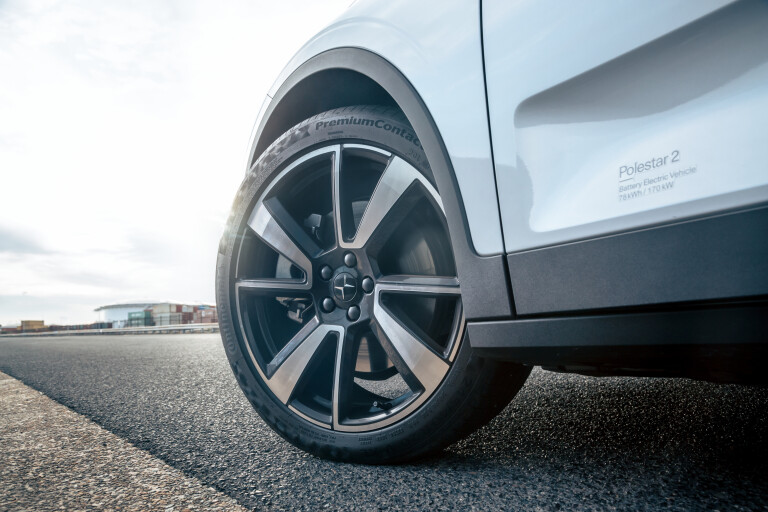
You also get an energy-saving heat pump, which will be handy for winter in southern states, as Polestar says it will improve range by up to 10 per cent when operating at an ambient temperature of between five and 15 degrees Celsius. The car I drove also had that and just to make absolutely sure, it also had the individual option of Nappa leather, which adds cooling to the front seats.
Not to harp on about it, but on the Standard Range you can add the Pilot Pack or the Plus Pack without blowing your rebate, but you can’t add anything to the Long Range. The Dual Motor is over the limit either way, but if you fit both option packs you’ll also lose the stamp duty concession available in some states.
You can’t get the $8000 Performance Pack on the Single Motor cars, so you miss out on adjustable Öhlins dampers, Brembo brakes, forged 20-inch alloys and gold seatbelts.
One bizarre and glaring moment of weirdness is the tacky, cheap key job. Looking at the fob for a base-spec Kia Seltos, you’d think they were the same price. I can’t fathom how such a flimsy-feeling device got through the customer experience people at Polestar.
The Polestar 2 has been heralded as a Tesla killer. While it clearly isn’t, Polestar is going after the American brand with pricing, range and performance to get somewhere close to the Model 3.
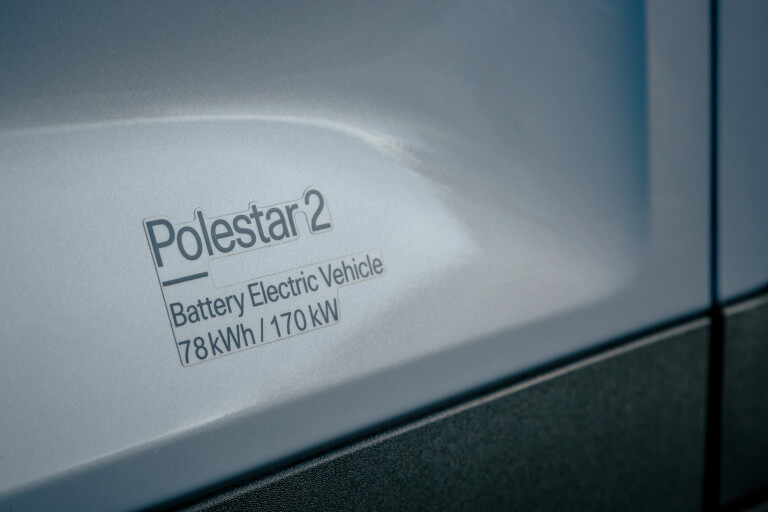
Comfort and Space
The Polestar 2 shares its underguts with the XC40 and I don’t mean the electric one, I mean all of them.
They’re all built on Volvo’s CMA platform, which is underneath the funky SUV and is Volvo’s bridge between all-ICE and all-EV. As such you’ll find a big transmission hump in the rear, which really does render this declared five-seater a 4+1.
Apart from that, the interior is beautiful. The recycled plastics are at first unusual to the touch, as are the 3D etching highlights, but all of it is visually appealing and beautifully tactile.
The optional Nappa leather is the nicest I’ve seen in a car south of $200,000. That’s not to say other cars aren’t this nice, but it is lovely to the touch, although kids might ruin it.
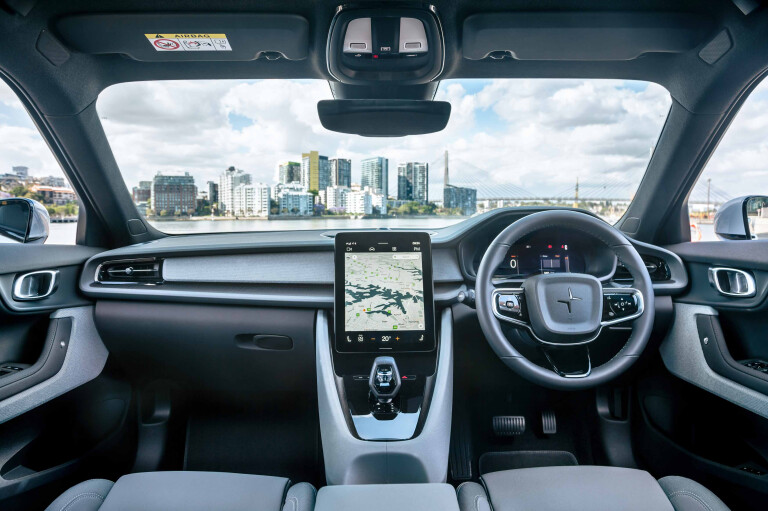
The big portrait screen is fast and that’s just as well because all the car's functions are crammed into it. The Android Automotive screen far exceeded my low expectations (I’m an Apple guy, which is an admission of both guilt and intolerable smugness).
There are more apps to come and I guess that means that most Android owners won’t have to worry about using their phone for a lot of stuff for which they might currently use Android Auto.
Apple CarPlay will arrive next year as part of an over-the-air (OTA) update and while Polestar reps told us that the Android setup is so good that iOS users won’t miss it, I can safely say bollocks to that as I want Apple CarPlay and I want it now. Bluetooth integration with an iPhone is tolerably good, however.
To power and connect your devices there are four USB-C ports (two up front, two in the rear).
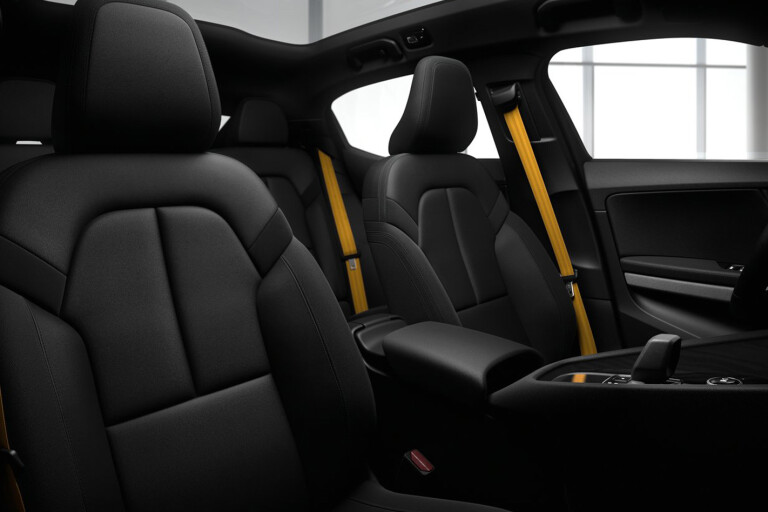
You get four cup holders in the cabin, with two in the front (one hidden by the elbow rest between the front seats) and the rear has them in the fold-down armrest. Each door has a bottle holder, but these aren’t French, so you won’t be getting big bottles in there, just 500ml or thereabouts.
Space in the rear is comfortable for my almost six-foot (180cm) frame, with a decent amount of toe, leg and headroom. The optional sunroof in both Polestars I’ve sat in robbed a bit of headroom and my head was quite close to the header rail.
The rear windows are lovely and big, though, meaning good vision out for rear passengers as well as for a head check when lane-changing. The view out of the rear window is hilariously restricted, but there’s just enough to see what’s going on.
Cargo space starts at 405 litres in the boot and a further 35 litres in the front, where most people will keep their charge cables. The tailgate is powered and you can open it with your key or phone.
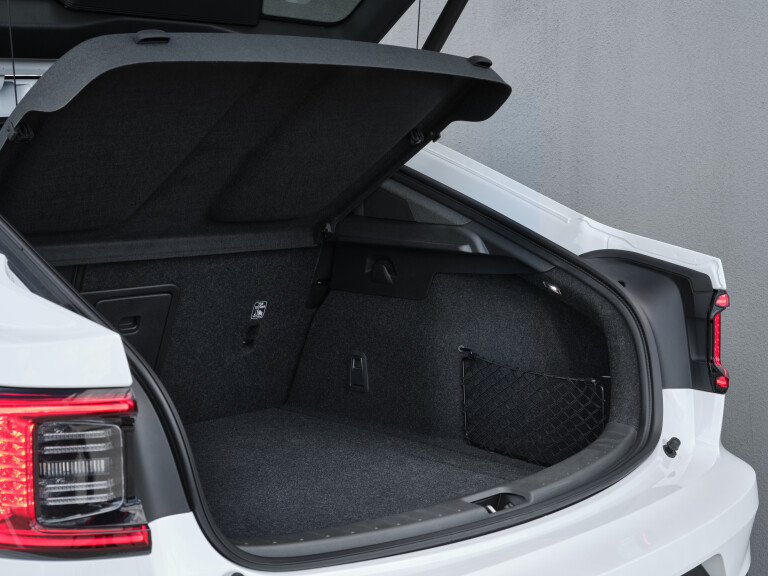
On the Road
The Standard Range/Single Motor combo means you’ve got front-wheel drive with 165kW and 330Nm. The Long Range comes with a bigger battery and a 5kW power bump, while the Dual Motor packs 300kW and 660Nm.
In both Single Motor cars, you’ll crack 100km/h in a handy 7.4 seconds. The Standard Range's WLTP figure is 440km, similar to that of the Ioniq 5, Tesla Model 3 and that other Hyundai EV, the Kona. Being an EV, you get just the one gear to take you to a theoretical maximum speed of 160km/h and you can tow up to 1500kg with a braked trailer.
Moving on to the Long Range adds a theoretical 100km of WLTP stamina, its bigger battery shared with the Dual Motor version.
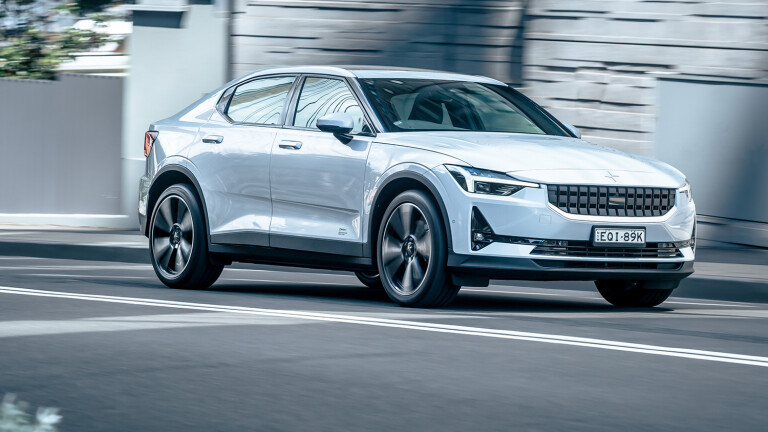
We’ve got a bit of a conundrum here with the battery consumption. The Long Range car I drove didn’t really come close to the WLTP claimed, but there are a few important points for context.
The first is that the cars were still very new and it’s unlikely that the battery had been through a full charging cycle. Second, we don’t drive cars the way most owners will, they get a bit of a pounding. Third, we only had the car for a bit less than 24 hours.
So, after all those caveats, we come to the consumption. From the short time we had the LR, it looked like the 540km range was closer to 400km. That’s a fairly decent gap but I think it’s reasonable to reserve judgement until we’ve had the cars for longer to really get to grips with the numbers. Our collective experience with the Ioniq 5, for instance, had it hitting its WLTP numbers and we’ve had a few of them.
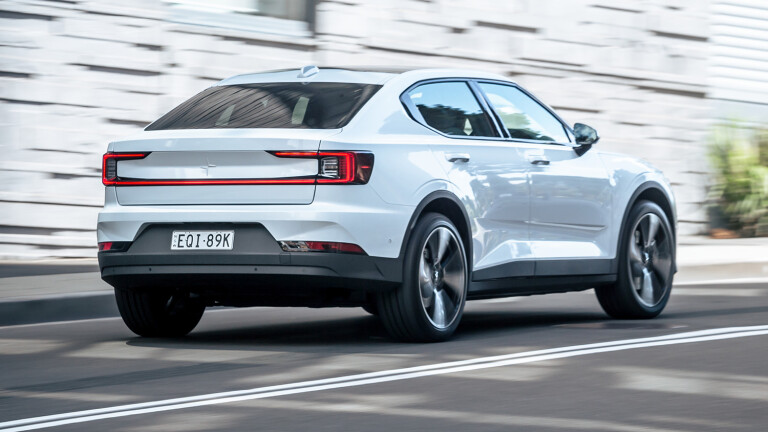
Charging varies depending on whether you have a Standard Range or Long Range model. The former has 24 lithium-ion modules providing 69kWh of energy capacity and an 11kW onboard charger for a seven-hour charge with a wallbox, while the 400-volt system can cope with up to 130kW DC for rapid recharging to 80 per cent in 40 minutes.
The Long Range cars have 27 modules and 78kWh of capacity and will charge faster on a public charge station with 150kW DC, reaching 80 per cent in 35 minutes. The 22kW onboard charger means you’ll be done in eight hours.
Both battery sizes can also be charged from a regular 240-volt socket for emergencies but this replenishes them at a very slow rate.
The Long Range's DC charging numbers are roughly matched by Tesla’s Supercharger network, while the Ioniq 5 has an 800-volt architecture, meaning it can charge at up to 350kW, which is scorchingly fast but at the moment, compatible infrastructure is almost as rare as hydrogen filling stations.
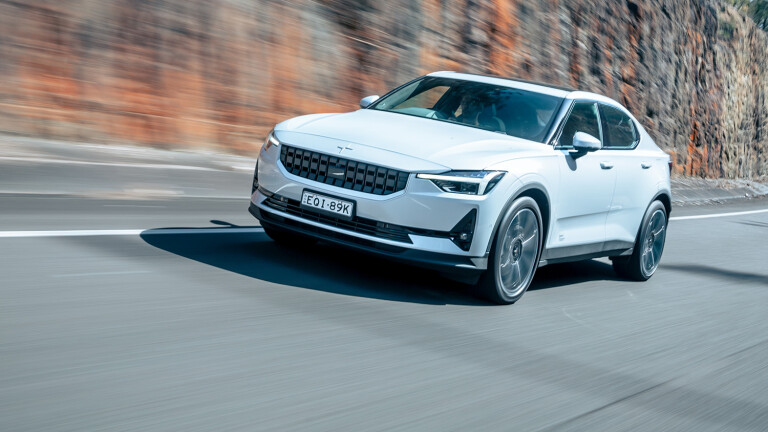
My main concern in EVs is the ride. For some reason, chassis engineers on the EVs I’ve driven seem to struggle to achieve consistent ride quality. You kind of know a car is electric by its weird, occasionally lumpy feel as it negotiates particular types of surfaces. And so the ride of the Polestar 2 was a huge and pleasant surprise – it feels like a well-sorted “normal” car.
Despite running on optional 20-inch rims and Continental PremiumContact 6 rubber (with POL stamped on the side to show they are made specifically for Polestar), the 2’s suspension was supple and quiet, the latter quality a big deal in near-silent EV running. It handles big bumps extremely well and even those evil rubber speed bumps in car parks are barely noticeable.
When you’re pressing on, the chassis’ ability also becomes apparent. Despite being a two-tonne front-drive liftback, it’s like a warm hatch. You can choose three levels of assistance for the steering but even the firmest isn’t too much or too artificial. I’m not going to pretend the steering has tons of feel but you know enough about what the tyres are doing and, being an EV, you hear a lot more from the road surface.
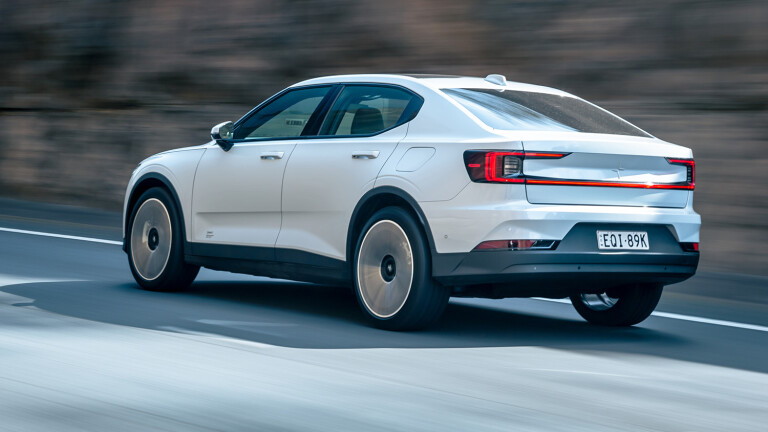
You can also choose two levels of regenerative braking – none or on. The latter is fairly aggressive and means one-pedal operation in city driving is possible and remarkably intuitive.
Creep mode can also be set on or off, which means you can choose whether you need to hold the car on the brakes at the lights. I had it on at first but quickly realised it was better switched off while driving but turning it back on when you’re parking makes that a lot less stressful.
The cabin really added to the generally serene experience when just driving normally. An evening run across the city before getting down to business on the video shoot left me unusually unrustled, partly down to the lack of traffic but also because it was just such an easy pleasant drive with an ergonomic layout that doesn’t need any reference to YouTube videos to make it work.
When you’re pressing on, the chassis’ ability also becomes apparent. Despite being a two-tonne front-drive hatchback, it’s like a warm hatch.
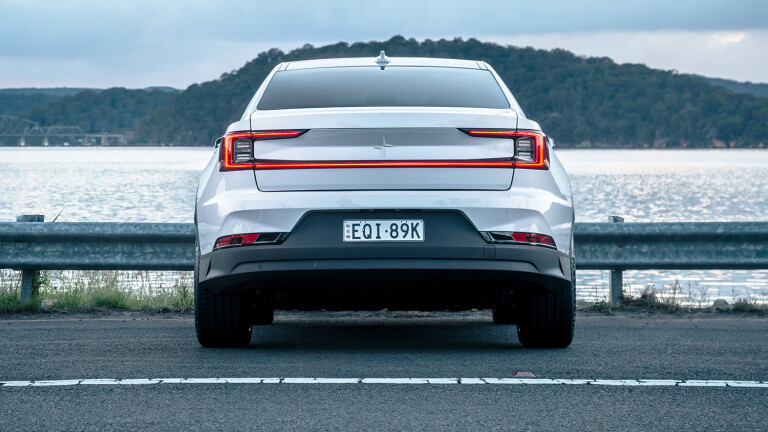
Ownership
Buying a Polestar will be different to sister brand Volvo. Polestar Spaces will be set up in urban areas, a bit like the Genesis showroom model, so no dealers suggesting they’ll have to talk to their manager about getting you the best price. You can buy the car at a Space via the exact same website you’d use at home.
The larger Polestar Destinations will be in more suburban areas and will feature delivery points for your new car.
The Polestar 2 has a five-year package covering warranty (unlimited kilometres), roadside assist and free servicing (five years/100,000km). A separate battery warranty covers you for eight years/160,000km. That seems entirely reasonable and pretty much matches or beats its (current) key rivals, Tesla and Hyundai. You’ll return to the dealer once a year or every 20,000km.
Tesla’s Model 3 warranty is shorter at four years/80,000km (the battery’s is eight years/192,000km) while Hyundai wants $220 for a few services apart from the four-year service, which wallops you for $804.
Tesla doesn’t have a scheduled servicing program, preferring to point to its over-the-air software updates (Polestar has those) and only recommends replacing the cabin air filter and having a brake fluid test every two years. You can schedule a Tesla service appointment in the app.
As always with Tesla, the website is quite vague on the details and prices of various items but as I will always tell people, not having someone see your car at least once a year is a bit of a safety issue – EVs (all of them) are heavy and rip through tyres.
Polestar says it’s “going its own way” but you can take your car to a Volvo dealer when it needs seeing to.
The Google Services connectivity subscription lasts for three years and there is an integrated e-SIM to power those.
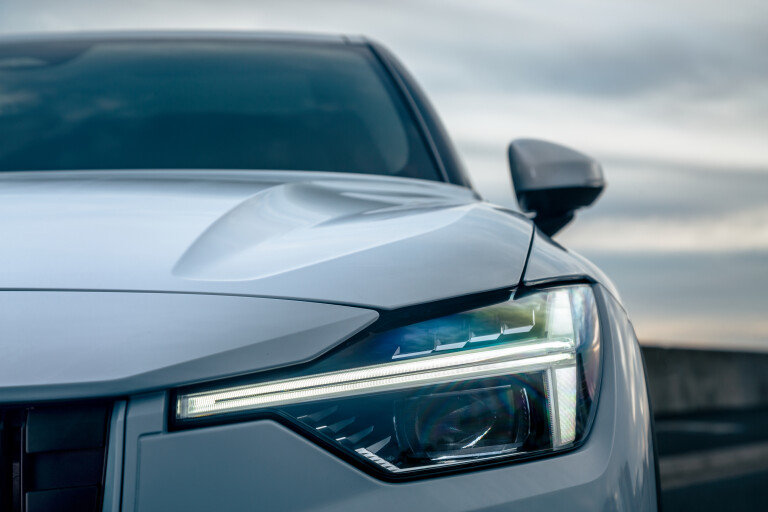
VERDICT
The Polestar may not match either the Model 3 or Ioniq 5 for safety features, but neither does it make them completely unavailable. And it’s cheaper than the Ioniq, so that somewhat softens that argument – a well-specced Standard Range or Long Range model still comes in under the price of the Ioniq. So it’s a straighter fight with the Model 3, something we hope to one day cover in detail.
In isolation and with my concerns about battery range pushed to the side, the Polestar 2 is a brilliant Australian reboot for the now-electric brand. It looks great, is well priced and has a beautifully balanced chassis. It’s not going to convince the haters – nothing can, let’s face it – but along with the Ioniq, the Polestar 2 is proof that EV capability is going up while prices are edging slowly down.
It’s also got huge backing from Geely and Volvo and that Australian connection to the brand will surely yield a few conversions. All I need now is more time with it.
2022 Polestar 2 Single Motor Long Range specifications
| Body: | Five door hatchback |
|---|---|
| Drive: | FWD |
| Engine: | Single motor electric |
| Transmission: | Single speed |
| Power: | 170kW @ 0rpm |
| Torque: | 330Nm @ 0rpm |
| Battery capacity: | 78kWh |
| 0-100km/h: | 7.4 sec (claimed) |
| Fuel consumption: | 17.1kWh/100km (combined) |
| Weight: | 1994kg |
| Suspension: | MacPherson strut front/multi-link rear |
| L/W/H: | 4606mm/1859mm/1479mm |
| Wheelbase: | 2735mm |
| Brakes: | 345mm ventilated disc front / 320mm ventilated disc rear |
| Tyres: | 245/40 R20 Contintental PremiumContact6 |
| Wheels: | 20-inch wheels (no spare) |
| Price: | $64,900 + ORC and before incentives |
Score breakdown
Things we like
- Brilliant interior
- Fantastic ride
- Impressive chassis
Not so much
- No Apple CarPlay (yet)
- RCTA not standard
- Option package costs
- Cheap-feeling physical key



COMMENTS